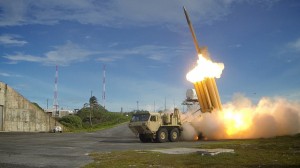SecDef Carter: Do Missile Defense Review Urged By Greenert, Odierno
Posted on
Tight budgets have a way of encouraging critical thinking and forcing a willingness to make painful but well-grounded tradeoffs.
The Chief of Naval Operations, Adm. Jonathan Greenert, and the Army Chief of Staff, General Raymond Odierno, wrote a November letter about the weaknesses of our current missile defense approach to then-Defense Secretary Chuck Hagel. This letter, recently leaked to the press, could signal a real reorientation of the U.S.’ ballistic missile defense programs.
Greenert and Odierno told Hagel that “a ballistic missile defense strategy assessment is warranted” due to “the long-term budgetary horizon and the attendant financial pressures.” (It should be noted they made this statement without the signature of Gen. Mark Welsh, the Air Force Chief of Staff.)
Hopefully, this means that real debate is occurring within the Pentagon about whether to save money by favoring proven technologies used by the Navy and Army over advanced technologies that the Air Force prizes but that remain stuck in research after decades of work.
This tradeoff is one of several that the Stimson Center anticipated in our report, “Opportunity from Necessity.” Writing in early 2013, we considered a “restructuring of the investment in ballistic missile defense programs to protect investments in the proven technologies” and determined that the impact of such a cut would be limited. The reason is simple: regional adversaries like North Korea are more likely to launch a ballistic missile attack – although still exceedingly unlikely – and the U.S. already can defend against such an attack. The Aegis BMD system deployed on the Navy’s destroyers, together with the Army’s Patriot-3 and Terminal High Altitude Air Defense systems (THAAD), are the right responses to that threat.
The U.S. should jump at options that save badly-needed money without any national security risk, like this one. Sadly, that doesn’t mean it will actually happen. Very powerful constituencies in the Air Force and Congress have interests beyond national security strategy in these perpetual research programs.
The Air Force’s interest is financial. It is the Pentagon’s executive agent for space, putting it in a key position if technologies meant to intercept missiles mid-flight at the edge of Earth’s atmosphere ever come to fruition. Going back to 1984, these programs represent the grandest ambition behind the $173 billion total spent on ballistic missile defense.
Welsh may have been protecting this financial interest when he decided not to sign the letter to Hagel. Meanwhile, Greenert and Odierno may have suggested a ballistic missile defense strategy assessment because they expect that it would help relieve pressure on their own services’ budgets.
If the Pentagon conducts such an assessment – something we cannot take for granted – it also would receive a difficult reception in Congress. Ballistic missile defense is fundamentally a political issue for lawmakers: Their positions depend much more on how they feel about Ronald Reagan than on how they evaluate U.S. security. President Reagan popularized ballistic missile defense as part of his “Star Wars” program early in the 1980s and, ever since then, Republicans have often reflexively supported these investments and Democrats have — for the most part — opposed them.
Financial disputes within the Pentagon and political disputes on Capitol Hill could go either way. Air Force opposition may be enough to eliminate the idea, or joint efforts by the Navy and the Army may give it real energy. Congress has a decades-long track record of paying for perpetual research and, while that may well continue, it also is possible that fiscal hawks in the GOP could team up with some Democrats to take money from these research programs.
The right move for U.S. taxpayers is clear. Defense Secretary Carter should pursue a strategic assessment of US missile defense in line with what Adm, Greenert and Gen. Odierno recommended. Such an assessment could help the U.S. abandon ineffective research programs, raise the priority on ballistic missile defense programs that work, and save money when the Budget Control Act is about to bite..
Matthew Leatherman is a nonresident fellow at the nonpartisan Stimson Center.
Subscribe to our newsletter
Promotions, new products and sales. Directly to your inbox.



